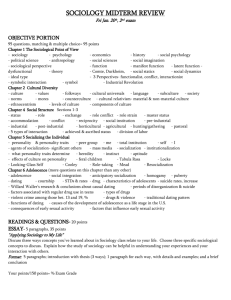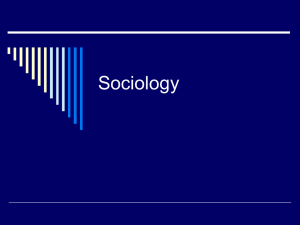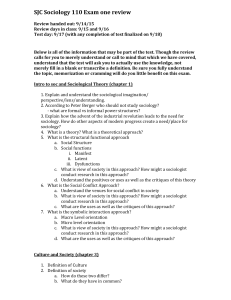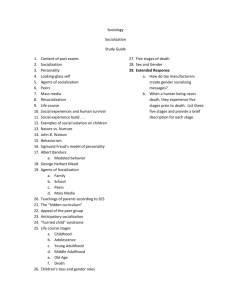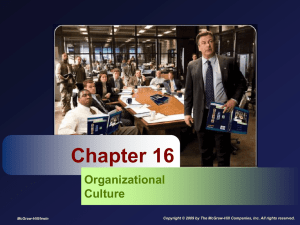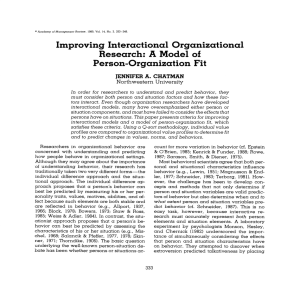Sociology Exam Review
advertisement
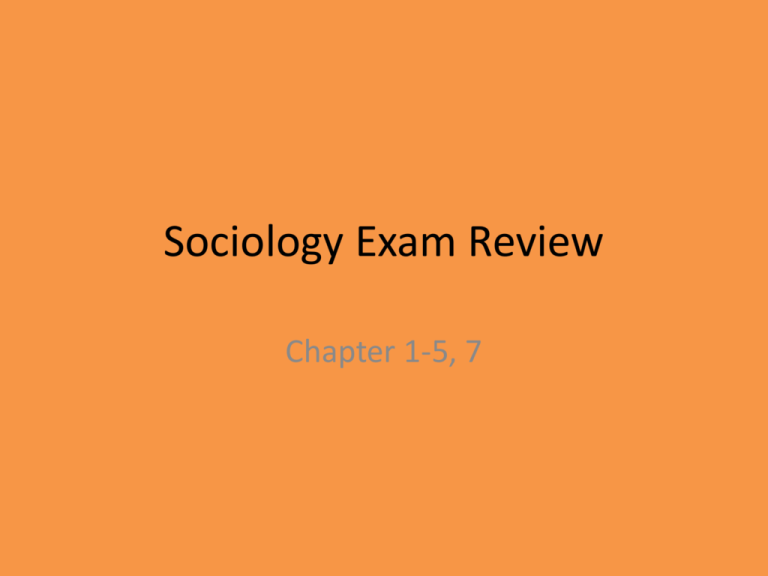
Sociology Exam Review Chapter 1-5, 7 Name the Social Science • • • • Studies human society and social behavior Studies people and events of the past Studies behavior and mental processes Comparatively studies past and present cultures • Studies the organization and operation of government Name the Perspective • Focuses on how individuals interact with one another in society • Focuses on forces in society that promote competition and change • Focuses on gender inequality • Believes society is held together by consensus • Views society as a set of interrelated parts that work together to produce a stable social system Name the Scholar • He was expelled from Paris for believing workers would eventually revolt and create a classless society • She set up Hull House in Chicago to assist the poor • He was the founder of Sociology • He believed that ideas about observable phenomena can be tested using statistical analysis; first to use science to study society • He helped found the NAACP and studied the significance of race in US society Roles and Statuses • Status that plays the greatest role in shaping a person’s life • Process through which people go through to detach from a role central to their identity; example divorce • Assigned status based on qualities beyond a person’s control • Socially determined behaviors expected of a person performing a role • Term for different roles attached to a single status Name the type of group • This type of group has structure, goals and activities that are clearly defined • A circle of friends is an example of this type of group • Group where people interact regularly on the internet; facebook and myspace on examples • A group a person belongs to and identifies with that has 3 characteristics: symbols, positive view of themselves, and competition with other groups • A group a person identifies with Socialization • This agent of socialization is the most important in almost every society • Term for the untamed children with few human characteristics, and no reasoning or manners due to their social isolation • This theory of socialization refers to the interactive process in which we develop our image of ourselves based on how we imagine we appear to others • Playing dress up and taking part in organized sports are important steps in this theory of socialization • This theory of socialization suggests that each of us is born without a personality and it develops from social experience Personality • The sum total of the behaviors, attitudes, and beliefs that are characteristic to an individual; don’t think too hard • This is a biologically unchanging inherited behavior pattern • Capacity to learn a certain skill like being good at tennis • Break with past experiences and learning new values and norms; happens in jail • This sociology career focuses on how genetic makeup impacts your behavior Dating and Adolescence • Main purpose of this type of dating is to find a spouse • Main purpose of this type of dating is for entertainment and status • On the dating continuum – what has the highest level of commitment? • What percent of new HPV, Chlamydia, and genital herpes cases occur among 14 – 19 year olds? • What characteristic of adolescence is missing? biological growth and development, undefined status, increased pressures, search for self Sanctions • Punishment or threat of punishment used to enforce conformity • A reward or punishment given by a regulatory agency, a school, a business, or a government • Spontaneous expression of approval or disapproval by an individual or group • Process by which a norm becomes a part of an individual's personality • Enforcing norms through either internal or external means Type of Crime • Homicide, rape, robbery, aggravated assault • Fraud, tax evasion, embezzlement, insider trading • Prostitution, illegal gambling, illegal drug use • Drug trafficking or illegal gambling as part of a large-scale crime syndicate • Burglary, larceny, arson Give me an ‘S’ • Process in which you learn appropriate gender roles • Group of interdependent people who have organized to share a common culture; this word is NOT interchangeable with culture • Rewards or punishments that are used to enforce conformity • Group with status and roles that are organized to satisfy one or more needs of society • Observable fact or event that involves human society Interaction • Deliberate attempt to control or oppose someone; has little or no rules of conduct • Social interaction term for a balance between competition and cooperation; compromise is an example • Action of doing something for someone after that person has done something for you • Name for the smallest group possible; means two • Goffman’s idea that individuals attempt to play roles well and we judge the performances of others Culture • Tendency to view one’s own culture and group as superior; can lead to discrimination • The development of economic and social relationships that stretch around the world • Process in which cultures become more and more alike • These ensure fulfillment of some need and are common in all cultures • Education and technology are emphasized in this type of society Intro to Behavior • Shared rules of conduct that tell people how to act in specific situations; US examples are financial responsibility and to shake hands when introduced • Intended and recognized consequence of some element of society • Unintended and unrecognized consequence of some element of society • Most serious norms are formalized into these: folkways – mores - __________ • Situation that arise when the norms of society are unclear or no longer applicable


